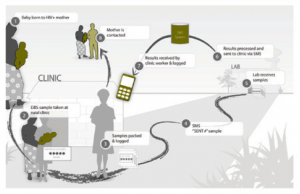Our Impact on Changing Statistics
Guest Blog Writer: Abigail Rendos, Secretary-elect
Global health improvement: three powerful words that embody EWB USA’s main goal and our focus, as EWB’s BU student Chapter, while we work towards improving health standards in Zambia. Often, these goals become a guideline of our responsibilities as BU engineers as we attempt to better the lives of those in our partner community by developing and implementing sustainable engineering designs. One of our main initiatives within the field of global health is a project aimed at increasing the quality of cell signal in Naluja, Zambia. Our Yagi Antenna, in partnership with CGHD’s Project Mwana, serves to expedite the delivery of newborn HIV test results through SMS text messages to the new mothers of the community. By hastening this process, more mothers will be able to take the measures necessary to ensure the health of their children during the critical stages of infancy.

Flow chart explanation of SMS text notification process
(Image from Frog Design For United Nations Children Fund)
These efforts are meant to help the locals of Naluja and to serve as an example for other communities as they also try to combat the prevalence of HIV using m-Health initiatives. Much of the health concern in Zambia revolves around the passing of HIV from mother to infant, which accounts for 21% of HIV contraction in Zambia overall (Steidenberg). Giving an expectant mother anti-viral medication can help prevent them from transferring the disease to their children, but if the infant does contract the disease, we hope that our antenna will ensure the infant starts receiving treatment as soon as possible. Early detection decreases the rate of mortality later in life, thereby increasing the standard of living for people with HIV/AIDS. It is a great way to positively impact lives in Zambia, as much of Africa is attempting similar programs to help lessen the impact of HIV. That is why we, within our EWB-BU chapter, are so excited for the progression of the Yagi Antenna project and are looking forward to bettering our current model during our upcoming Summer 2014 trip to Naluja!
A promising study conducted by the United Nations in multiple African countries shows a huge decrease in infant contraction of HIV/AIDS in recent years. Among others, Zambia “reported reductions of at least fifty percent” since 2009 (Stuart). This is an amazing feat for these countries whose main health concern has been HIV/AIDS for many years because of the inability to completely treat an infected person. Even more surprisingly, Ghana reported a 76% reduction of HIV in infants. These are breakthrough statistics for countries in Africa, as they set a great example for other developing regions struggling to prevent the spread of infectious diseases.
Even more encouraging is the use of a similar text message program by the World Health Organization, which has been implemented in other countries and regions of Zambia (Thea). The WHO’s use of text message transmission reassures our organization that the work we do does have an impact on our partner community and has the potential to change statistics. We hope our progress with the antenna in Zambia will help improve the chances of even more children surviving HIV and further reduce the amount contracting the disease in the first place. Global health improvement is at the core of our organization and is an integral part of increasing the standard of living for the people in Naluja.
Works Cited
Steidenberg, Phil, Donald Thea, Stephen Nicholson, Merrick Schaefer, Katherine Semrau, Maximillian Bweupe, Noel Masese, Rachael Bonawitz, Lastone Chitembo, and Caitlin Goggin. (n.d.): n. pag. World Heath Organization. WHO, 15 Mar. 2012. Web. 13 Mar. 2014.
Stuart, Elizabeth. “How to Achieve an AIDS Free Generation? Ghana Has a Few Ideas.” Global Post. Global Post-International News, 6 Dec. 2013. Web. 13 Mar. 2014.
Leave a comment